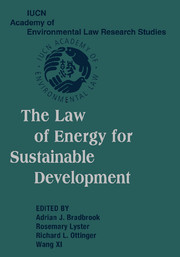Book contents
- Frontmatter
- Contents
- Acknowledgments
- Message from Kofi A. Annan, Secretary-General, United Nations
- Introduction – A Global Learned Society to Address Earth's Evolution: The IUCN Academy of Environmental Law
- Public Lectures on International Environmental Law
- PART ONE SUSTAINABLE DEVELOPMENT AND THE ROLE OF ENERGY LAW
- PART TWO LEGAL ISSUES IN CONTEMPORARY ENERGY LAW
- 7 Legal Frameworks for Energy for Sustainable Development
- 8 Air Pollution Control Laws: Common but Differentiated Responsibilities for Managing the Atmosphere
- 9 Green Pricing and Green Power Marketing: Demand-Side Mechanisms for Promoting “Green Power” in Deregulated Energy Markets
- 10 Agricultural Renewable Energy and Its Management in China
- PART THREE INTERNATIONAL ENERGY LAW
- PART FOUR COMPARATIVE ENERGY LAW
- PART FIVE ELECTRICITY RESTRUCTURING
- PART SIX FINANCING FOR SUSTAINABLE ENERGY
- PART SEVEN CIVIL SOCIETY AND THE PROCEDURAL REQUIREMENTS OF ENERGY LAW FOR SUSTAINABLE DEVELOPMENT
- Index
7 - Legal Frameworks for Energy for Sustainable Development
Published online by Cambridge University Press: 10 August 2009
- Frontmatter
- Contents
- Acknowledgments
- Message from Kofi A. Annan, Secretary-General, United Nations
- Introduction – A Global Learned Society to Address Earth's Evolution: The IUCN Academy of Environmental Law
- Public Lectures on International Environmental Law
- PART ONE SUSTAINABLE DEVELOPMENT AND THE ROLE OF ENERGY LAW
- PART TWO LEGAL ISSUES IN CONTEMPORARY ENERGY LAW
- 7 Legal Frameworks for Energy for Sustainable Development
- 8 Air Pollution Control Laws: Common but Differentiated Responsibilities for Managing the Atmosphere
- 9 Green Pricing and Green Power Marketing: Demand-Side Mechanisms for Promoting “Green Power” in Deregulated Energy Markets
- 10 Agricultural Renewable Energy and Its Management in China
- PART THREE INTERNATIONAL ENERGY LAW
- PART FOUR COMPARATIVE ENERGY LAW
- PART FIVE ELECTRICITY RESTRUCTURING
- PART SIX FINANCING FOR SUSTAINABLE ENERGY
- PART SEVEN CIVIL SOCIETY AND THE PROCEDURAL REQUIREMENTS OF ENERGY LAW FOR SUSTAINABLE DEVELOPMENT
- Index
Summary
Traditional energy production, dependent largely on the burning of biomass in rural areas and the burning of fossil fuels in industrialized areas, poses threats of economic, environmental, and social hardship for the world through global warming and for developing countries through exhaustion on energy-related imports of hard currency resources that are desperately needed for education, sanitation, health care, and other vital human needs.
There are proven cleaner and more affordable alternatives, including ways to use fossil fuel resources much more efficiently. Many of them are analyzed in The World Energy Assessment (WEA), sponsored by the UN Development Program (UNDP), the UN Department of Economic and Social Affairs (DESA), and the World Energy Council (WEC). The WEA, http://www.undp.org/seed/eap/activities/wea/, is an invaluable tool for countries to apply to resolve their energy challenges and resultant energy-related economic and environmental problems.
To effectuate these alternatives, legal structures to promote them are indispensable. Much attention has been given to new energy technologies and the means of technology transfer and capacity building. Very little attention has been given to the legal frameworks essential to their implementation. This chapter addresses these legal frameworks.
GENERAL MEASURES
Subsidy removal
Among the legal measures to promote energy for sustainable development, by far the most significant is legislation to remove fossil fuel and nuclear subsidies. Subsidy removal not only is a costless measure, but by definition, it is a certain revenue enhancing one.
- Type
- Chapter
- Information
- The Law of Energy for Sustainable Development , pp. 103 - 123Publisher: Cambridge University PressPrint publication year: 2005
- 1
- Cited by

